September 28th, 2024 | by Duncan Covey
Duncan Covey is a 25 year old endurance cyclist and adventurer from the South West of the UK. On April 6th 2024, he began a 40,000km, year long journey around the world by bike. Now 6 months into his journey, he is currently riding through India.
The entire Bivo team has enjoyed following along Duncan's journey on hisInstagramand love his upbeat daily updates!
To read Duncan's first story sharing why he wanted to cycle around the world to begin with,check it out here.
From the moment the idea of an around the world bike ride turned from daydreaming into a very real and fast approaching adventure, I found my daily workplace visits to Google maps centred on one specific region: “The ‘Stans”. I knew very little about Central Asia and found that the more I asked around my friends and colleagues, there was a distinct lack of first hand stories to hear. In a world where someone’s done everything, the apparent absence of stories was immensely exciting. Of course, many people have travelled to, cycled through and explored even the most remote corners of Central Asia. I hadn’t though, and to be able to pedal out into the relative unknown, both in terms of environment, culture and exploring my limits as an endurance athlete, was enough to spark an itch in my brain that was only going to be satisfied by experiencing the region for myself.
It was mid July by the time I arrived in Aktau, a small city on the shores of the Caspian Sea in Western Kazakhstan. Initially, I had hoped to ride through Georgia, making my way to Baku, Azerbaijan where there’s the possibility, according to traveller’s folklore, of paying for a bunk on a cargo shipping route across the water to Kazakhstan. However, the land borders for entry to Azerbaijan remain closed post pandemic as geopolitical tensions rise with neighbouring Armenia so the ferry route was not to be. It felt a little anticlimactic to finish the first leg of the ride across Western Europe, through the Balkans and the vast, yet fascinatingly varied regions of Turkey with a flight from Tbilisi to Aktau on Day 100 of the adventure. That said, tense borders are not something I’m willing to mess with for the sake of continuity of a bike ride.
Duncan Covey is a 25 year old endurance cyclist and adventurer from the South West of the UK. On April 6th 2024, he began a 40,000km, year long journey around the world by bike. Now 6 months into his journey, he is currently riding through India.
The entire Bivo team has enjoyed following along Duncan's journey on hisInstagramand love his upbeat daily updates!
To read Duncan's first story sharing why he wanted to cycle around the world to begin with,check it out here.
From the moment the idea of an around the world bike ride turned from daydreaming into a very real and fast approaching adventure, I found my daily workplace visits to Google maps centred on one specific region: “The ‘Stans”. I knew very little about Central Asia and found that the more I asked around my friends and colleagues, there was a distinct lack of first hand stories to hear. In a world where someone’s done everything, the apparent absence of stories was immensely exciting. Of course, many people have travelled to, cycled through and explored even the most remote corners of Central Asia. I hadn’t though, and to be able to pedal out into the relative unknown, both in terms of environment, culture and exploring my limits as an endurance athlete, was enough to spark an itch in my brain that was only going to be satisfied by experiencing the region for myself.
It was mid July by the time I arrived in Aktau, a small city on the shores of the Caspian Sea in Western Kazakhstan. Initially, I had hoped to ride through Georgia, making my way to Baku, Azerbaijan where there’s the possibility, according to traveller’s folklore, of paying for a bunk on a cargo shipping route across the water to Kazakhstan. However, the land borders for entry to Azerbaijan remain closed post pandemic as geopolitical tensions rise with neighbouring Armenia so the ferry route was not to be. It felt a little anticlimactic to finish the first leg of the ride across Western Europe, through the Balkans and the vast, yet fascinatingly varied regions of Turkey with a flight from Tbilisi to Aktau on Day 100 of the adventure. That said, tense borders are not something I’m willing to mess with for the sake of continuity of a bike ride.
Perhaps venturing through the hostile border regions of Azerbaijan and Armenian might’ve been safer though. The morning after the flight, I woke feeling like I’d been hit by a truck, with my energy levels through the floor. With a delayed 1am flight leading to a night spent on the airport floor, I initially put it down to a lack of sleep, but when a few days later I still couldn’t get out of bed, I knew something was wrong. A few days of rest turned into a couple of weeks while a virus got to work but eventually I was ready to get to back on the road.
My route planning to get across the west of Central Asia was a relatively straightforward affair. With limited infrastructure beyond town limits, road choice was simple. The feeling as I rode out of Aktau was electric. I rolled out through the industrial edges of town and within minutes was riding through a barren wasteland with only the occasional camels for company. The first leg across the desert could be broken into two sections, with the small town of Shetpe nestled at the bottom of a rogue hill after two days of slogging into a roasting headwind. I took about another week off here, resting up in an extremely dodgy motel, having realised a little too late after departing the Caspian coast that I hadn’t recovered and was in no fit state to be riding a bike across a desert. After a few unexpected and stressful dramatics at the hand of the owners (my Russian comprehension is virtually nonexistent but the frogmarching outside and the vodka fuelled shouting and shoving that followed was enough to know they wanted more money) I snuck out at 3am and was well clear by daybreak.
Perhaps venturing through the hostile border regions of Azerbaijan and Armenian might’ve been safer though. The morning after the flight, I woke feeling like I’d been hit by a truck, with my energy levels through the floor. With a delayed 1am flight leading to a night spent on the airport floor, I initially put it down to a lack of sleep, but when a few days later I still couldn’t get out of bed, I knew something was wrong. A few days of rest turned into a couple of weeks while a virus got to work but eventually I was ready to get to back on the road.
My route planning to get across the west of Central Asia was a relatively straightforward affair. With limited infrastructure beyond town limits, road choice was simple. The feeling as I rode out of Aktau was electric. I rolled out through the industrial edges of town and within minutes was riding through a barren wasteland with only the occasional camels for company. The first leg across the desert could be broken into two sections, with the small town of Shetpe nestled at the bottom of a rogue hill after two days of slogging into a roasting headwind. I took about another week off here, resting up in an extremely dodgy motel, having realised a little too late after departing the Caspian coast that I hadn’t recovered and was in no fit state to be riding a bike across a desert. After a few unexpected and stressful dramatics at the hand of the owners (my Russian comprehension is virtually nonexistent but the frogmarching outside and the vodka fuelled shouting and shoving that followed was enough to know they wanted more money) I snuck out at 3am and was well clear by daybreak.
It would be another couple of days across the desert to reach the final town before the Kazakh-Uzbek border with the occasional small village along the way. Resupply options were unreliable and limited at best so I carried instant noodles, tinned fish (I managed to resist my curiosity over the range of tinned horse in the markets) and 12 litres of water at a time. I came across a bus shelter in the middle of nowhere at the end of the first day so began to prepare some food in the shade when a car pulled up and a local jumped out. He shook my hand enthusiastically and poured me a mug of tea from a flask. With no common language or phone signal for Google Translate, we drank our tea in comfortable silence as he inspected my bike with a pinch of the tyres and a squeeze of the brakes. Satisfied, he poured me another tea, shook my hand and drove off into the sunset.
I’d barely finished my tea when another family pulled up and poured out to take a photo with me before producing a crisp, cold bottle of iced tea from a cooler in the boot, refilling my bottles and insisting that I washed my hands and face in a small bowl. Eventually I got into my sleeping bag on the bus stop bench, sleeping happily in the knowledge that there were so many kind, friendly people in the country. This would only be compounded when I reached the small town of Beyneu some 80km from the border where I was invited to spend the night at the apartment of some Kazakh Marines - completely mental but incredibly generous with their hospitality, gifting me a cap from their uniform before I left. A special memento from my first days in Kazakhstan.
It would be another couple of days across the desert to reach the final town before the Kazakh-Uzbek border with the occasional small village along the way. Resupply options were unreliable and limited at best so I carried instant noodles, tinned fish (I managed to resist my curiosity over the range of tinned horse in the markets) and 12 litres of water at a time. I came across a bus shelter in the middle of nowhere at the end of the first day so began to prepare some food in the shade when a car pulled up and a local jumped out. He shook my hand enthusiastically and poured me a mug of tea from a flask. With no common language or phone signal for Google Translate, we drank our tea in comfortable silence as he inspected my bike with a pinch of the tyres and a squeeze of the brakes. Satisfied, he poured me another tea, shook my hand and drove off into the sunset.
I’d barely finished my tea when another family pulled up and poured out to take a photo with me before producing a crisp, cold bottle of iced tea from a cooler in the boot, refilling my bottles and insisting that I washed my hands and face in a small bowl. Eventually I got into my sleeping bag on the bus stop bench, sleeping happily in the knowledge that there were so many kind, friendly people in the country. This would only be compounded when I reached the small town of Beyneu some 80km from the border where I was invited to spend the night at the apartment of some Kazakh Marines - completely mental but incredibly generous with their hospitality, gifting me a cap from their uniform before I left. A special memento from my first days in Kazakhstan.
It was a different experience when I reached the border, with severe overcrowding on the Kazakh side with border guards more interested in soliciting bribes to escape the queues than organising the chaos. It was more straightforward for me as a Westerner on a bike; I could skip the queue and was waved through most of the process. After a couple of overwhelmingly sweaty hours, I was welcomed into Uzbekistan and began riding into country number 17. I stopped off in the first village to get local currency for the weeks ahead and decided to grab some food in a small cafe, before riding on to find somewhere to camp. I’d just finished eating when I was waved over to join a couple of lads about my age who insisted on buying me more chicken skewers, beers and hard, salty cheese balls. Wonderfully proud, hospitable people who were as keen to give a good impression of their country as they were to learn about mine. It was a wobbly ride out of town after a couple of beers (four months of heavy riding are my excuse…) but as I lay in my bivvy bag, the stars were beyond anything I’d ever seen before; an array of colours beyond the distant spots of light with shooting stars leaving fizzling trails across the sky so frequently that I couldn’t sleep until I’d seen just one more…
The following day was a shock to the system. I started riding before sunrise to make the most of the slightly more bearable temperatures, but it wasn’t long before the relentless heat of the sun arrived. In a landscape of sand and knee high shrubs, there was no shade to be found beyond the occasional, seemingly abandoned road work trucks. The road across the region of Karakalpakstan was in awful condition, cratered with potholes to resemble the surface of the moon but the good fortune for cyclists is the current building of a brand new road, running a few hundred metres from, but parallel to the original route. It was closed to traffic with sandbanks to stop cars at regular intervals that slowed progress as I dragged the 50kg of bike, kit, food and water up and over each blockade. Temperatures soared to the mid forties with a suffocating headwind that made each breath feel uncomfortable as I inched my way across the emptiness. The target was the small, yet infamous town of Jasliq where, up until recently, there was a prison that has been alleged to have been a black site notorious for human rights abuses, with reports of torture and numerous deaths. Pressure from the international community and the desire of new Uzbek leadership closed the facility to improve the country’s image on the international stage. A bleak history in an equally inhospitable environment, with temperatures ranging from -20°C in the winter up to the high forties I was experiencing.
Eventually a small truck stop appeared out of the heat haze, just as the air began to fill with dust and sand. I ended up spending the next few days hiding out in this truck stop as a sandstorm roared through, filling myself with plate after plate of oily plov, the Uzbek rice dish typically topped with gristly horse meat and thinly sliced raw onion. I was buzzing to get back on the bike when the air finally cleared and made the most of the great, fresh road surface and a gentle tailwind to ride the remaining 275km to Nukus in a single push, marking the end of the largest desert stretch I’d cross in the region. All relatively plain sailing, bar an incident with some worryingly drunk and aggressive locals who dragged me to a house to try to extort cash… a story for another day.
It was a different experience when I reached the border, with severe overcrowding on the Kazakh side with border guards more interested in soliciting bribes to escape the queues than organising the chaos. It was more straightforward for me as a Westerner on a bike; I could skip the queue and was waved through most of the process. After a couple of overwhelmingly sweaty hours, I was welcomed into Uzbekistan and began riding into country number 17. I stopped off in the first village to get local currency for the weeks ahead and decided to grab some food in a small cafe, before riding on to find somewhere to camp. I’d just finished eating when I was waved over to join a couple of lads about my age who insisted on buying me more chicken skewers, beers and hard, salty cheese balls. Wonderfully proud, hospitable people who were as keen to give a good impression of their country as they were to learn about mine. It was a wobbly ride out of town after a couple of beers (four months of heavy riding are my excuse…) but as I lay in my bivvy bag, the stars were beyond anything I’d ever seen before; an array of colours beyond the distant spots of light with shooting stars leaving fizzling trails across the sky so frequently that I couldn’t sleep until I’d seen just one more…
The following day was a shock to the system. I started riding before sunrise to make the most of the slightly more bearable temperatures, but it wasn’t long before the relentless heat of the sun arrived. In a landscape of sand and knee high shrubs, there was no shade to be found beyond the occasional, seemingly abandoned road work trucks. The road across the region of Karakalpakstan was in awful condition, cratered with potholes to resemble the surface of the moon but the good fortune for cyclists is the current building of a brand new road, running a few hundred metres from, but parallel to the original route. It was closed to traffic with sandbanks to stop cars at regular intervals that slowed progress as I dragged the 50kg of bike, kit, food and water up and over each blockade. Temperatures soared to the mid forties with a suffocating headwind that made each breath feel uncomfortable as I inched my way across the emptiness. The target was the small, yet infamous town of Jasliq where, up until recently, there was a prison that has been alleged to have been a black site notorious for human rights abuses, with reports of torture and numerous deaths. Pressure from the international community and the desire of new Uzbek leadership closed the facility to improve the country’s image on the international stage. A bleak history in an equally inhospitable environment, with temperatures ranging from -20°C in the winter up to the high forties I was experiencing.
Eventually a small truck stop appeared out of the heat haze, just as the air began to fill with dust and sand. I ended up spending the next few days hiding out in this truck stop as a sandstorm roared through, filling myself with plate after plate of oily plov, the Uzbek rice dish typically topped with gristly horse meat and thinly sliced raw onion. I was buzzing to get back on the bike when the air finally cleared and made the most of the great, fresh road surface and a gentle tailwind to ride the remaining 275km to Nukus in a single push, marking the end of the largest desert stretch I’d cross in the region. All relatively plain sailing, bar an incident with some worryingly drunk and aggressive locals who dragged me to a house to try to extort cash… a story for another day.
As I reached the south of the country, both the landscapes and the theme of the riding changed. Fertile lands took over, with signs of ancient trading towns scattered across the map and the all encompassing graft and suffering of desert riding subsiding. That was until I ate a dodgy somsa, a small meat filled pastry a little like a Cornish pasty on my entry to Khiva. It was to be the start of a month of violent stomach issues. It was fascinating to ride through a different landscape and a great chance to meet more locals as I rode through small villages, including an invite to a wedding meal as I sheltered from a particularly heavy rain storm close to Samarkand.
I arrived into Samarkand worn down by the attritional few weeks of riding across deserts and debilitating stomach troubles, but excited to meet up with Dad. He’d spent a lifetime wanting to visit the Silk Road trading city of Samarkand and a large part of my dreams to ride a bike through Central Asia had come from growing up hearing him enthusing over the travel books of people exploring the region; if I was to share the next few weeks of riding with anyone, it was only ever going to be Dad.
After a couple of days exploring Samarkand’s spectacular tiled mosques and bustling bazaars, we rode north, with plov being replaced by delicious plates of boso lagman - a popular stir fried noodle dish that at last contained at least the occasional vegetable. It took us about a week of riding to reach the Kyrgyz border. Initially we’d planned for slightly shorter days than I had been riding out of caution, with Dad having been told earlier in the year that he needed a knee replacement. As it turned out, with cautious riding and rehab exercises, the knee held up fine but the shorter days were needed as both our stomachs continued to writhe and dictate the day’s riding.
As I reached the south of the country, both the landscapes and the theme of the riding changed. Fertile lands took over, with signs of ancient trading towns scattered across the map and the all encompassing graft and suffering of desert riding subsiding. That was until I ate a dodgy somsa, a small meat filled pastry a little like a Cornish pasty on my entry to Khiva. It was to be the start of a month of violent stomach issues. It was fascinating to ride through a different landscape and a great chance to meet more locals as I rode through small villages, including an invite to a wedding meal as I sheltered from a particularly heavy rain storm close to Samarkand.
I arrived into Samarkand worn down by the attritional few weeks of riding across deserts and debilitating stomach troubles, but excited to meet up with Dad. He’d spent a lifetime wanting to visit the Silk Road trading city of Samarkand and a large part of my dreams to ride a bike through Central Asia had come from growing up hearing him enthusing over the travel books of people exploring the region; if I was to share the next few weeks of riding with anyone, it was only ever going to be Dad.
After a couple of days exploring Samarkand’s spectacular tiled mosques and bustling bazaars, we rode north, with plov being replaced by delicious plates of boso lagman - a popular stir fried noodle dish that at last contained at least the occasional vegetable. It took us about a week of riding to reach the Kyrgyz border. Initially we’d planned for slightly shorter days than I had been riding out of caution, with Dad having been told earlier in the year that he needed a knee replacement. As it turned out, with cautious riding and rehab exercises, the knee held up fine but the shorter days were needed as both our stomachs continued to writhe and dictate the day’s riding.
Into Kyrgyzstan and we immediately found ourselves in Osh, another ancient Silk Road city, rich with cultural and historical importance for the transit of goods from the far east into Central Asia and the west. After a couple of nights in a dated ex-Soviet hotel with a frankly terrifying, crumbling seventh floor balcony, we got back on the road. The roadside melon stalls were replaced with pumpkins and the intensity of interest in our presence seemed to reduce slightly, which I found to be a welcome change. The interactions throughout the region had undoubtedly been well intentioned but I’d still found it overwhelming at times, especially when riding solo.
The riding became a different beast as we left the town of Jalal-Abad and the tarmac ended, with chunky gravel tracks leading through the mountains and into the sky. The mountains were simply incredible and by following dirt and gravel tracks, we were able to get away from the traffic and deeper into the remote wilderness that had been eagerly anticipated by us both. Every corner produced yet another postcard worthy view, the sheer scale of which was often tricky to describe and impossible to capture on camera. I began to really suffer as we progressed further into the mountains but put it down to riding a 45kg bike over rough terrain with thin, yet incredibly dusty air at the high altitudes we were riding at.
A positive mindset could only get me so far however, and when I practically ground to a halt, we headed to a hospital for some checks. Turned out that I wasn’t just weaker than I’d hoped, I’d been trying to ride with pneumonia, so spent the best part of a week on an IV drip in the hospital to promote a speedy recovery. It seemed to work and before too long, we were back to gentle days on the road to spend a final week soaking in the extraordinary beauty of Kyrgyzstan, riding along under the Tian Shan mountains before crossing back into Kazakhstan. A few days of faster riding across the grassy Kazakh steppe and we rolled into Almaty where we were generously invited to stay in the home of a Brit who’s based out here for work.
From here, Dad flies home and I’ll fly to New Delhi (avoiding China without a visa and swerving Afghanistan) where I’ll continue into and across Nepal before heading down through south east Asia, ready for an Aussie Christmas. Updates as always over on Instagram @duncancoveyuk and another instalment here soon!
Into Kyrgyzstan and we immediately found ourselves in Osh, another ancient Silk Road city, rich with cultural and historical importance for the transit of goods from the far east into Central Asia and the west. After a couple of nights in a dated ex-Soviet hotel with a frankly terrifying, crumbling seventh floor balcony, we got back on the road. The roadside melon stalls were replaced with pumpkins and the intensity of interest in our presence seemed to reduce slightly, which I found to be a welcome change. The interactions throughout the region had undoubtedly been well intentioned but I’d still found it overwhelming at times, especially when riding solo.
The riding became a different beast as we left the town of Jalal-Abad and the tarmac ended, with chunky gravel tracks leading through the mountains and into the sky. The mountains were simply incredible and by following dirt and gravel tracks, we were able to get away from the traffic and deeper into the remote wilderness that had been eagerly anticipated by us both. Every corner produced yet another postcard worthy view, the sheer scale of which was often tricky to describe and impossible to capture on camera. I began to really suffer as we progressed further into the mountains but put it down to riding a 45kg bike over rough terrain with thin, yet incredibly dusty air at the high altitudes we were riding at.
A positive mindset could only get me so far however, and when I practically ground to a halt, we headed to a hospital for some checks. Turned out that I wasn’t just weaker than I’d hoped, I’d been trying to ride with pneumonia, so spent the best part of a week on an IV drip in the hospital to promote a speedy recovery. It seemed to work and before too long, we were back to gentle days on the road to spend a final week soaking in the extraordinary beauty of Kyrgyzstan, riding along under the Tian Shan mountains before crossing back into Kazakhstan. A few days of faster riding across the grassy Kazakh steppe and we rolled into Almaty where we were generously invited to stay in the home of a Brit who’s based out here for work.
From here, Dad flies home and I’ll fly to New Delhi (avoiding China without a visa and swerving Afghanistan) where I’ll continue into and across Nepal before heading down through south east Asia, ready for an Aussie Christmas. Updates as always over on Instagram @duncancoveyuk and another instalment here soon!
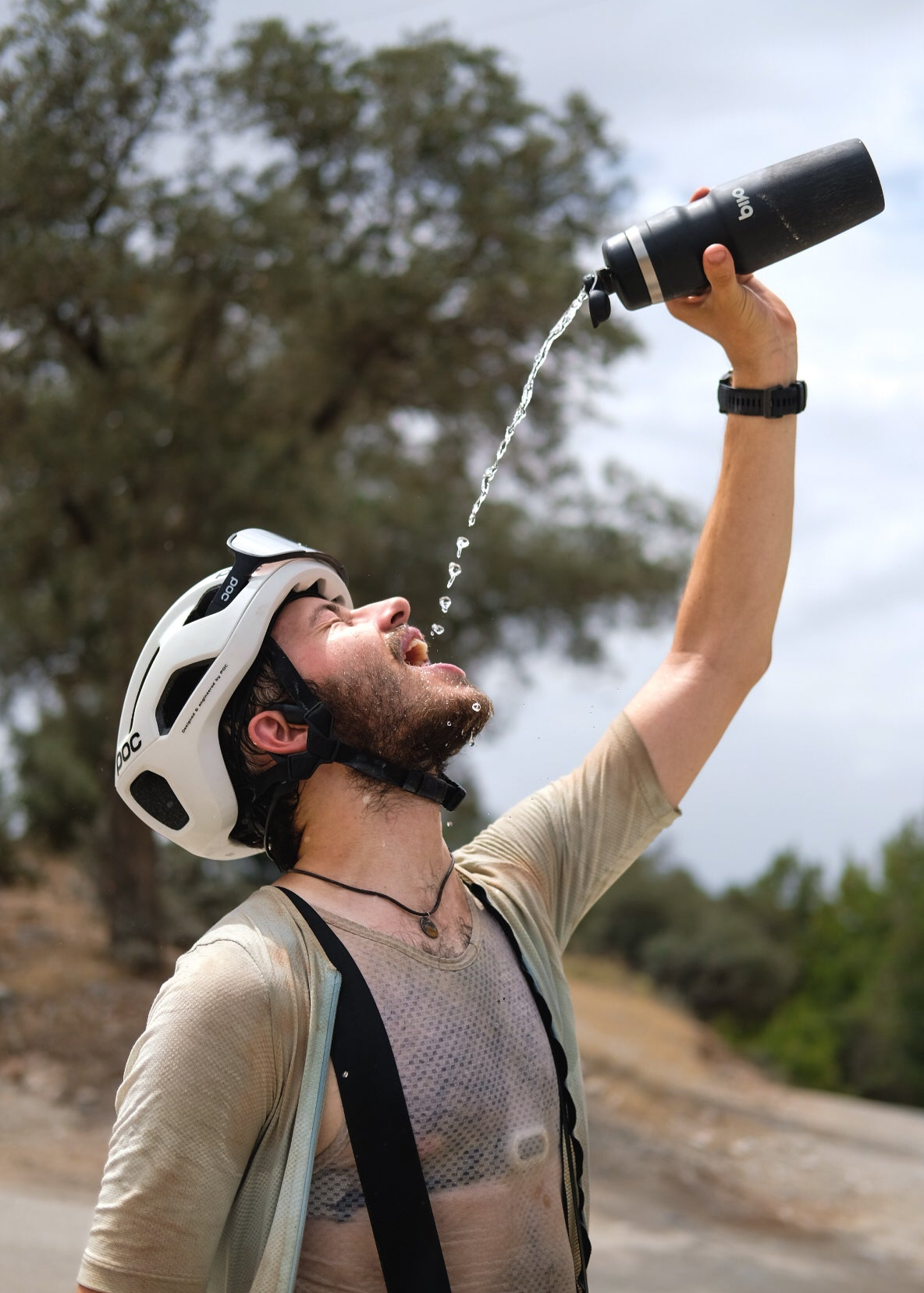
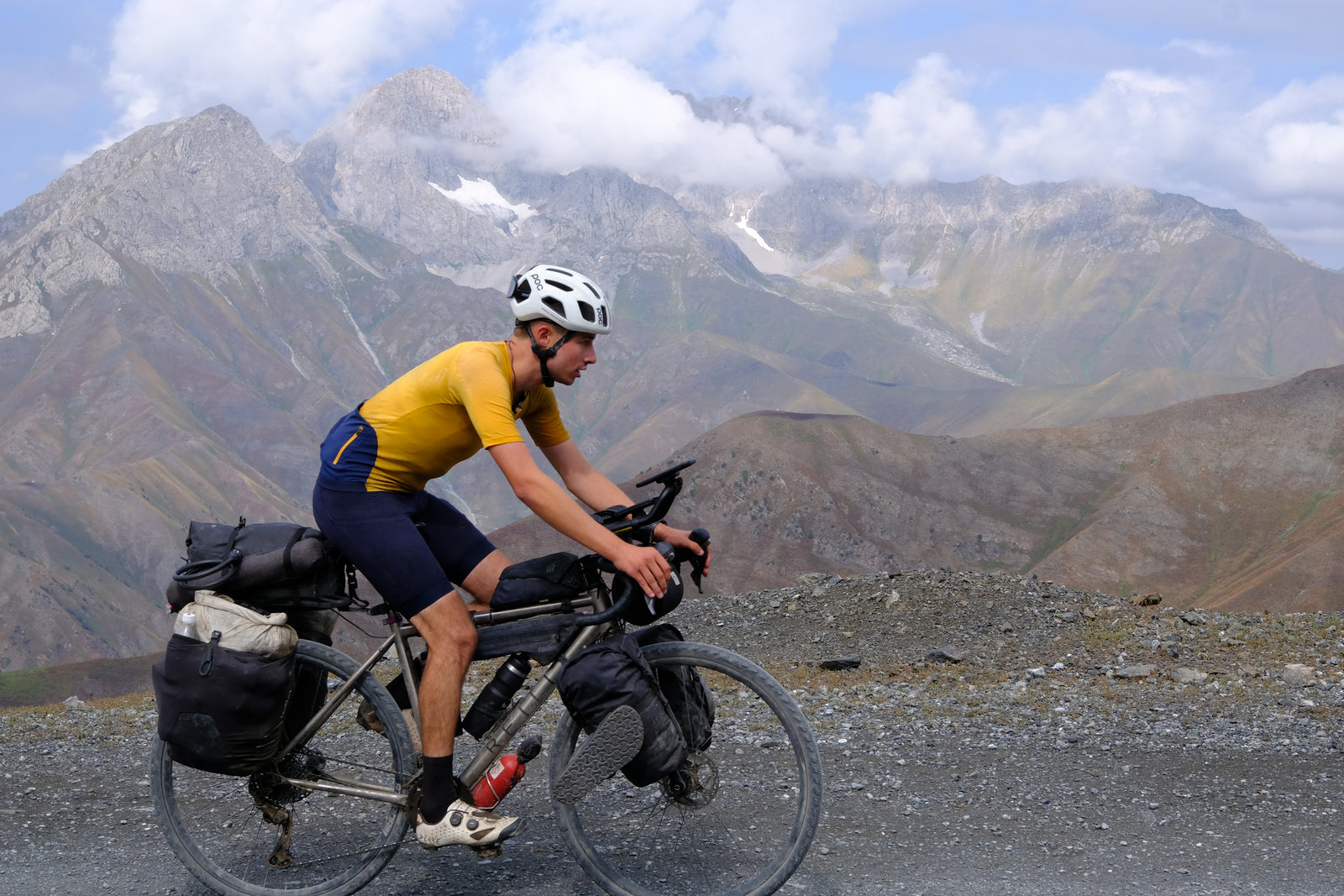
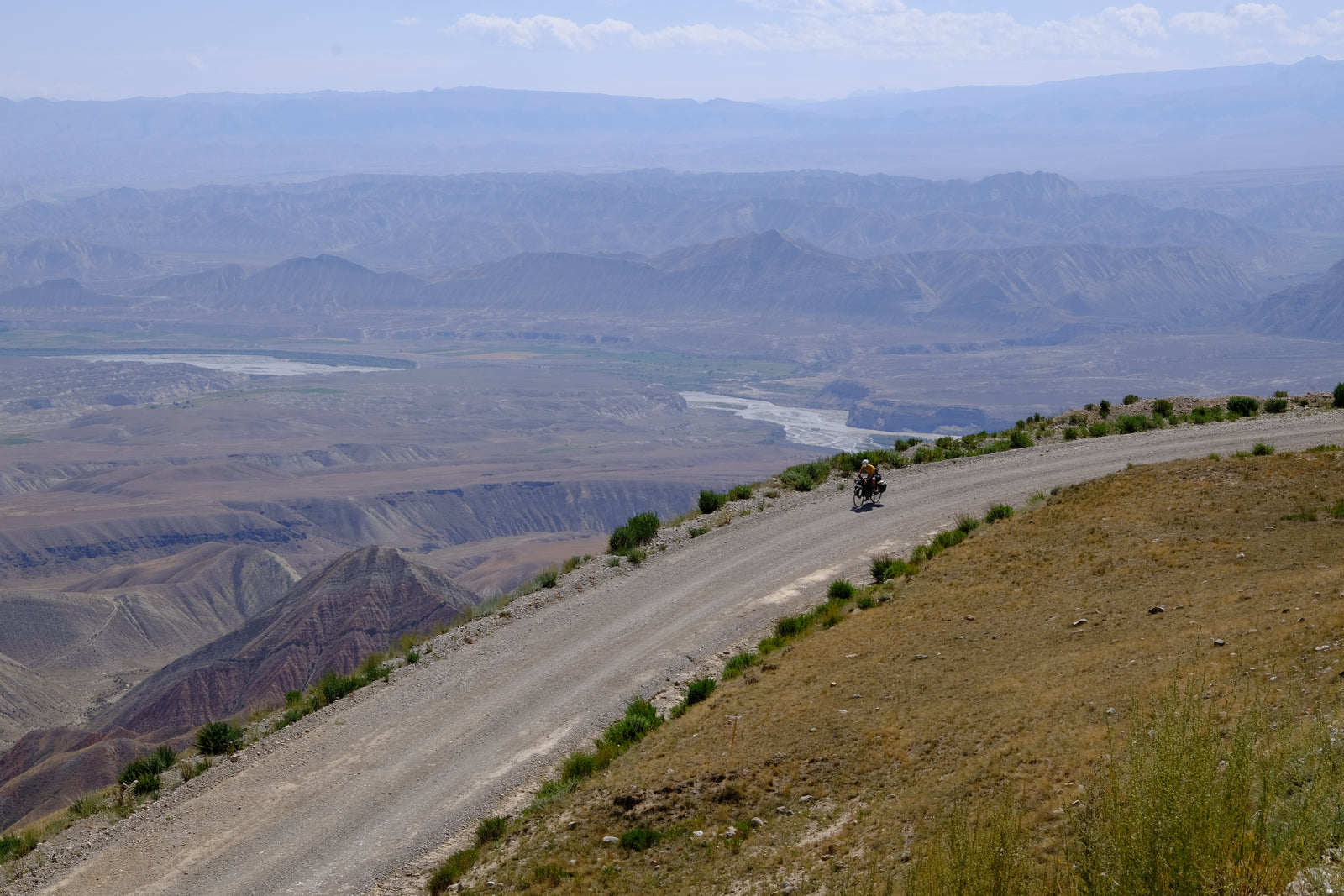
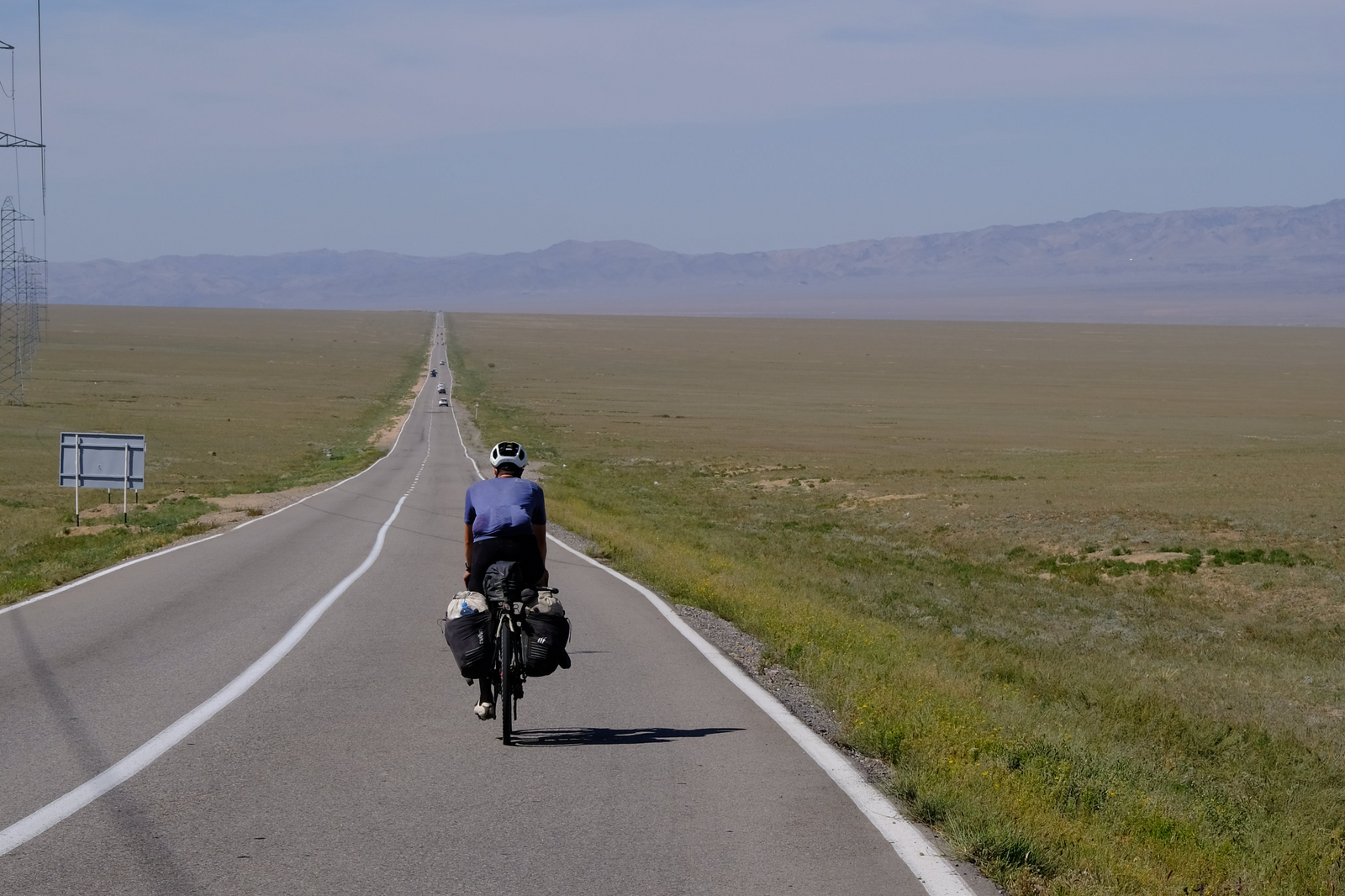
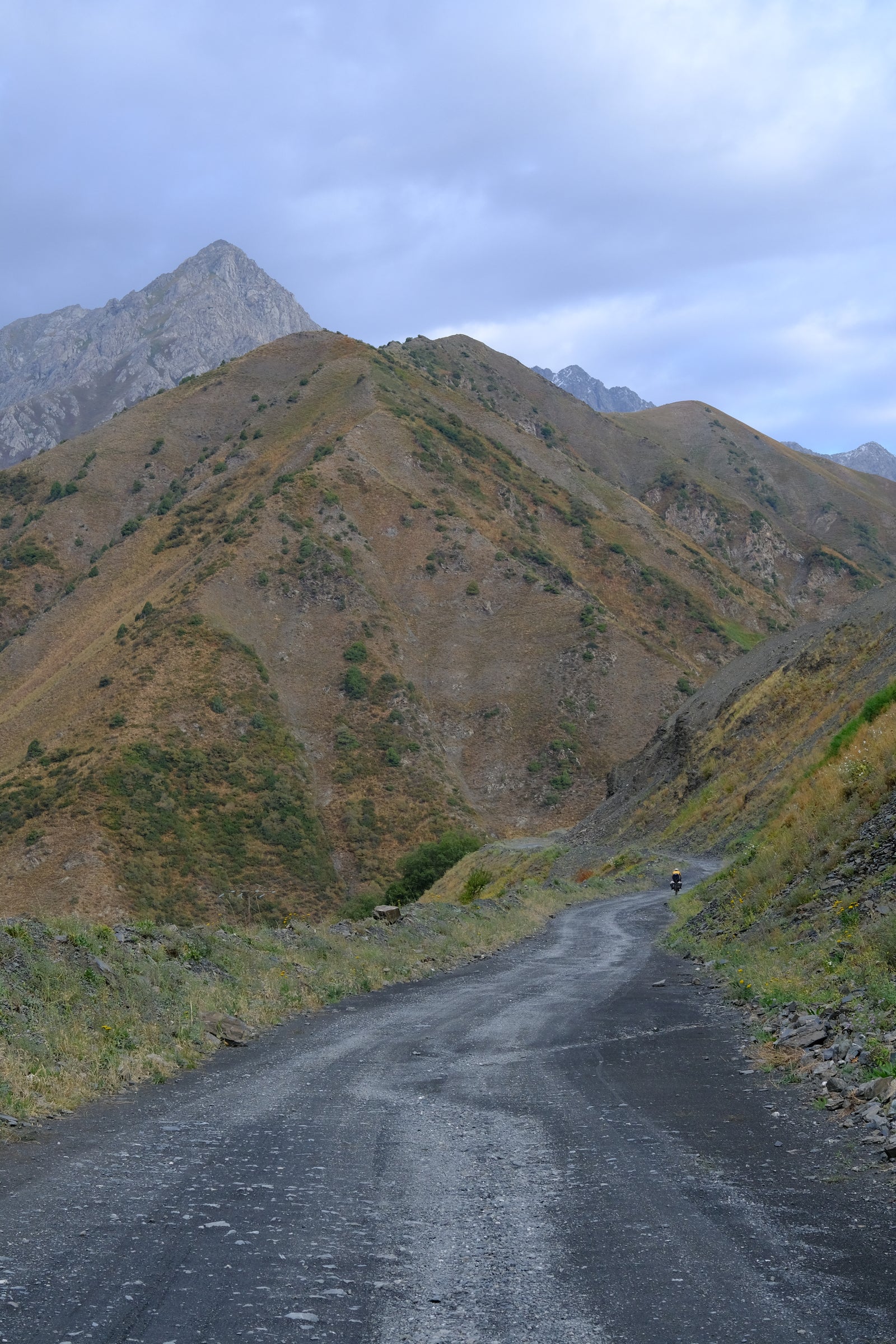
Hobbes
September 30, 2024
Makes me long for my younger days of bike touring. Still, given the risks of a few acting like idiots (shake downs for money, potential robberies), I'll pass and just experience from a distance by reading the blog. I wonder what Duncan dig to secure his bike and gear when in restaurants or the hospital?